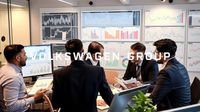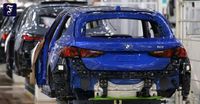The DAX index suffered significant losses on Thursday, March 27, 2025, dropping 1.54 percent to 22,488.09 points as a direct result of US President Donald Trump's announcement regarding auto tariffs. This decline pushed the German benchmark index further below the critical 21-day moving average, a key indicator for short-term trends, which had previously provided support during its consolidation from a record high of 23,476 points. Meanwhile, the M-DAX, which tracks medium-sized companies, fell by 1.35 percent to 28,473.82 points, and the EuroStoxx 50, the leading index for the Eurozone, declined by 1.3 percent.
Among the hardest-hit stocks were those of major automotive manufacturers. Shares of BMW, Volkswagen, Porsche, and Mercedes initially plummeted by four to five percent, with Porsche experiencing the steepest drop and Volkswagen the least. However, as the trading day progressed, the stocks managed to recover some losses: BMW was down 2.7 percent, Volkswagen 2.1 percent, Mercedes 3.7 percent, and Porsche 4.6 percent. Additionally, shares of Continental, a major auto parts manufacturer, fell by 3.2 percent.
In Milan, shares of Stellantis, the parent company of Chrysler, plummeted by 5.4 percent, reaching their lowest level since December 2020. London saw Aston Martin's shares dive almost nine percent to a record low. The overall market sentiment was dampened further by a lack of positive momentum from overseas, particularly following significant declines in the tech-heavy Nasdaq and the broader S&P 500 in New York the previous day.
Trump's plans to implement auto import tariffs on April 3, 2025, have been a source of anxiety in the German stock market. According to the Landesbank Helaba's daily outlook, the uncertainty surrounding potential countermeasures from trading partners is contributing to the market's jitters. The European Union announced plans to consult on the issue in the coming days. Economists from Commerzbank summarized the situation by stating, "Ultimately, protectionist barriers will rise even higher, increasing the risk of a tariff spiral." Analysts from Jefferies estimated that the tariffs could impact BMW's group sales by two percent, Volkswagen's by one percent, and Porsche's by ten percent.
If these tariffs remain in place, Wedbush analysts warned that they could act as a "hurricane-force" headwind for both foreign and many US automakers, potentially raising the average price of cars by $5,000 to $10,000.
In Asia, major stock markets also faced challenges, with most indices declining in response to Trump's tariff announcement. The Nikkei 225 in Japan closed down 0.6 percent at 37,799.97 points, with Toyota shares falling by two percent. The Australian S&P/ASX 200 index dropped 0.4 percent to 7,969 points. However, Chinese markets showed resilience, with the Hang Seng Index in Hong Kong rising by 0.67 percent to 23,639.89 points, and the CSI-300 Index of major mainland stocks increasing by 0.33 percent to 3,932.41 points.
Trump hinted at a possible reduction in additional tariffs on China in exchange for the Chinese government's approval of a sale of TikTok, stating, "Maybe I will give them a slight reduction in tariffs or something similar to finalize the deal."
In the context of Volkswagen, the company is currently evaluating strategic options for MAN Energy Solutions, which could include a partial sale or an initial public offering (IPO). This division, which specializes in gas turbines and marine engines, is estimated to be valued at around five billion euros. Discussions regarding these options are still in their early stages, and any potential deal is not expected to materialize this year. A Volkswagen spokesperson emphasized the company's commitment to actively managing its portfolio and seeking the right solutions for its investments.
On the stock front, Volkswagen shares were down 1.51 percent to 99.28 euros during XETRA trading, reflecting the overall weak environment for auto stocks. JP Morgan Chase & Co. maintained a "Neutral" rating for Volkswagen shares, with analyst Jose Asumendi identifying Renault, Iveco, Michelin, and Volvo Truck as relatively safe havens within the automotive sector. He noted that BMW has already estimated potential burdens from global import tariffs at around one billion euros.
Despite the current challenges, Volkswagen's stock has seen a year-to-date increase of 16.75 percent, although it remains down approximately 16 percent over the past twelve months. The company plans to launch a small car priced under 20,000 euros by 2027, and is partnering with Valeo and Mobileye to integrate autonomous driving functions up to Level 2+ in its models. This level of automation will provide drivers with assistance systems such as distance warning and lane-keeping assistance, enhancing safety and comfort.
As the automotive industry continues to evolve, Volkswagen is striving to catch up with competitors who are already ahead in the realm of electric vehicles and autonomous driving technologies. The pressure is on for the company to adapt quickly and effectively in a rapidly changing market.
In summary, the German stock market is facing significant volatility due to the impending auto tariffs announced by Trump, which have led to declines in key automotive stocks. With analysts predicting potential long-term impacts on sales and prices, the industry is bracing for a challenging period ahead. Investors will need to remain vigilant as the situation unfolds, particularly in light of the strategic decisions being made by major players like Volkswagen.









